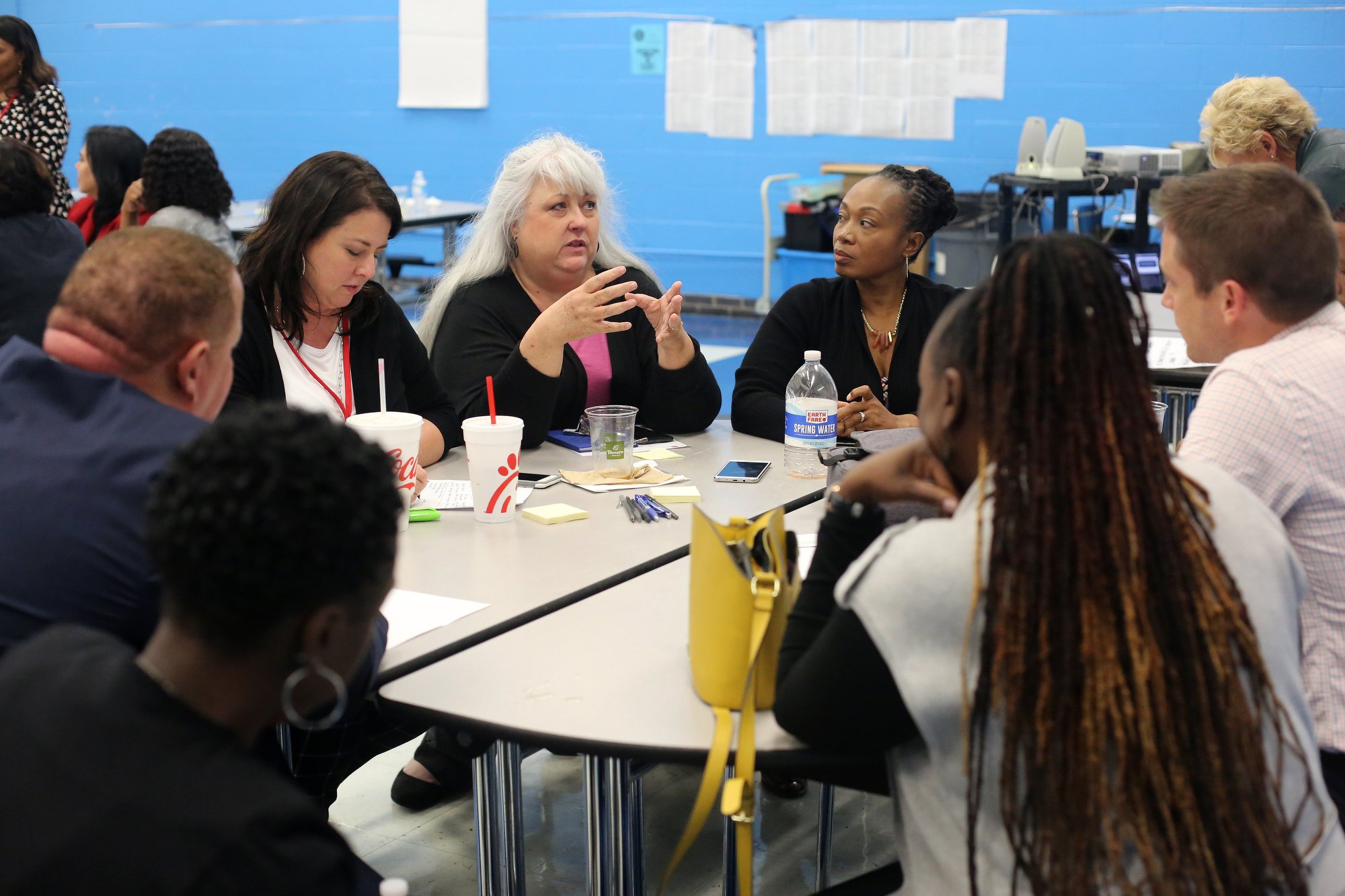Throughout Hamilton County's contentious debate this year over public education funding and whether or not Hamilton County Schools or its teachers deserve more funding, one question has continuously been asked by elected officials, state lawmakers and taxpayers - who exactly is a teacher?
And who gets a raise when "teachers" are promised one?
State Sen. Todd Gardenhire, R-Chattanooga, and state Rep. Mike Carter, R-Ooltewah, have long called for one official definition of what a "teacher" is that school districts and the state can stick to, and they have again been raising the issue with Hamilton County's school leaders and lawmakers.
 Staff photo by Erin O. Smith / Jeanette Omarkhail, the president of Hamilton County Education Association, speaks with her group during a roundtable discussion during a community meeting hosted by the Tennessee Department of Education Monday, October 28, 2019 at Brainerd High School in Chattanooga, Tennessee. The meeting was one of several held to gather input from stakeholders on ways to enhance supports and services to high-opportunity schools that are struggling to meet student needs.
Staff photo by Erin O. Smith / Jeanette Omarkhail, the president of Hamilton County Education Association, speaks with her group during a roundtable discussion during a community meeting hosted by the Tennessee Department of Education Monday, October 28, 2019 at Brainerd High School in Chattanooga, Tennessee. The meeting was one of several held to gather input from stakeholders on ways to enhance supports and services to high-opportunity schools that are struggling to meet student needs. "For a couple years, Mike and I have been trying to define what a teacher is. Everyone likes to use them as an excuse to do whatever they want to do. All we want to do is pick a definition and stick with it," Gardenhire said during a recent meeting at the Times Free Press with reporters and editors. "In our view, and for most people in Hamilton County, it's a person in a classroom in front of students working in the discipline they were trained in."
IF YOU GO: SUNDAY’S TOWNHALL
The Teacher Town Hall will be at 3 p.m. on Sunday at the Brainerd Youth and Family Development Center, 1010 North Moore Road. David Carroll of WRCB-TV Channel 3 will be moderating. For more information, visit: www.facebook.com/HamiltonCountyUnited/.
Now, when money is allocated for "teacher pay raises" at the state or local level, the people who spend all day in classrooms with students aren't the only ones who receive that raise.
The state's Basic Education Program (BEP) funding formula - how the state calculates how much money to give to Tennessee's 146 school districts - groups teachers with all "instructional staff."
Regular classroom teachers, special education teachers, vocational education, music or art teachers, school counselors, guidance counselors, social workers, librarians, principals, assistant principals, and even supervisors such as instructional coaches, teacher supervisors and staff who complete special education assessments for students all fall into the same category.
This way of allocating funding has led to controversy when governors, such as former Gov. Bill Haslam and current Gov. Bill Lee, announce certain percentage pay bumps for teachers - but then teachers don't see that at the school level.
In 2019, Lee announced a 2.5% increase in teacher salaries, but Hamilton County educators received only a one-time $1,500 bonus this year after the school board came to an agreement with the local teachers union, the Hamilton County Education Association, during collaborative conferencing.
In Hamilton County Schools' agreement with the union, the contract and negotiations cover all "professional employees" and the district breaks down employees as either "certified staff" - those who have a teaching license - or "classified staff."
The Tennessee Department of Education even has its own way of defining a teacher.
In an email, the department's Assistant Commissioner of Human Capital David Donaldson said, "I would say a teacher is an educator with an active Tennessee teaching license who is currently employed by a district in a teaching capacity."
Those who have teaching licenses but are employed paraprofessionals, administrators, deans, etc. would not be considered to be employed "in a teaching capacity," and shouldn't be considered teachers, department officials elaborated.
At a recent legislative breakfast attended by the local delegation including Gardenhire and Carter, county commissioners, school board members and others, District 5 school board member Karitsa Mosley Jones disagreed with such a narrow definition.
"If you graduate with a bachelor's of education, you're a teacher. If you're promoted through the ranks, you are still a teacher, whether you are a principal, an assistant principal, a guidance counselor, a librarian, you're still a certified teacher, so we have to acknowledge this," she said.
But Gardenhire and Carter believe it is misleading when teachers are used as the reason for budget requests or property tax increases such as those proposed during this year's budget cycle, but then those raises go to all employees in the district.
"We are promising teachers something that we are not delivering. The BEP is all black magic. No one actually understands it, no one wants to," Carter told the Times Free Press. "Teachers get used for tax increases, for pay raises - so when we run for a tax increase it's for teachers," but when it comes time to specify who gets the raise, it's for certified employees.
Hamilton County Commissioner David Sharpe, of District 6, asked the state representatives at the Nov. 7 legislative delegation meeting who has been getting raises who shouldn't have been, but his question went unanswered.
"Who are we angry [about] that is getting a raise that we don't think should be getting a raise?" Sharpe said.
Superintendent Bryan Johnson also noted the complexities of differentiating among employees when giving raises.
"The bottom line is certified employees represent a priority - think we have to acknowledge this. And I say this as someone who has taught in the classroom: leadership matters. So I struggle when we start to dissect the value of a principal or an assistant principal," he said. "Everyone who is certified in our district matters to us and everyone who is classified matters to us, so when we bring recommendations to the board around pay increases, if we are going to do something for one, we are going to try and do something for the other."
The Tennessee Comptroller's Office released a report in April that found that teacher raises could not be linked back to their funding source in most school districts across the state.
"The BEP formula's salary unit cost figure is not directly linked to pay raises for every teacher," the report read. Some policy considerations recommended by the report included in-depth surveys of how teacher salaries are funded or legislation defining who would receive such a raise or requiring districts to use BEP funding increases more specifically.
Carter and Gardenhire wouldn't confirm to the Times Free Press whether they intend to introduce legislation in the upcoming session to narrow down the definition of a teacher.
Teacher pay continues to be a concern in Hamilton County as more than 1,300 educators and community members have signed a petition calling out county commissioners who voted against funding increases for public education this year.
Some educators are calling for a 10% increase in 2020, and many will discuss the topic at Sunday's Teacher Town Hall at 3 p.m. at the Brainerd Youth and Family Development Recreation Center.
Staff writer Sarah Grace Taylor contributed to this story.
Contact Meghan Mangrum at mmangrum@timesfreepress.com or 423-757-6592. Follow her on Twitter @memangrum.
